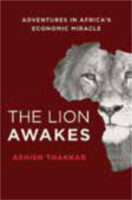Main content

The lion awakes: Adventures in Africa’s economic miracle
By Ashish J. Thakkar
St. Martin’s Press, New York, August 2015, 240 pages, €23.99
We want to do business with you, and we believe you will benefit from these business relationships as much as we will
With these words Ashish Thakkar introduces his recently published book The Lion Awakes. The author is a successful African entrepreneur whose conglomerate ‘Mara Group’ is active in 22 African countries. In this book he tells his story, together with many other stories of Africans like him – full of ambition, ideas and skills – aiming to show a different Africa, not the stereotype of a hopeless continent full of starving children, war and corruption, but the Africa full of opportunities, economic growth and development. After the success of the Asian tiger, the time has come for the African lion.
Our history is not our future
In the first part, Thakkar describes that lion, starting with his own story. His parents, of Indian-Ugandan background, were expelled from Uganda during the Idi Amin era. They fled to England but kept hoping to be able to return home one day. Ashish Thakkar is 14 years old when his family actually moves back to Africa. They start a business in Rwanda, where they witness the horror of the genocide in 1994. Despite this horrible history, the motto of the family, and of the whole book, is: “Our history is not our future”. Starting all over again for the second time in Kampala, Ashish sells his first computer when he is 15 years old and then decides to go into business. He leaves school and at the age of 16 establishes his own company in Dubai, from where he imports computer parts into Uganda. It is during that time in Dubai that, to his own surprise, he meets guys like him – young, ambitious and looking for business. That was not the image of Africa he got during his childhood in England.
One-sided story
Based on this anecdote, Thakkar fights the stereotype of a hopeless and dependent Africa, often based on (celebrity-driven) fundraising campaigns and one-sided news about war, hunger and disease. No matter how true this might be for parts of Africa, it is not true for the whole of it (‘Africa is a continent, not a country’). And no matter how good its intentions were, the aid model ‘fed corrupt rule in Africa and absolved rulers of their responsibility’. To quote the Nigerian author Chimamanda Ngozi Adichie, ‘The single story creates stereotypes, and the problem with stereotypes is not that they are untrue, but that they are incomplete. They make one story become the only story.’
When the West sneezes, Africa catches a cold?
As an example of Africa’s growing economic development, Thakkar mentions the impact of the global economic recession, or rather the lack of impact on Africa. Where in the past the African continent often paid the bill for political and economical changes in the rest of the world (like after the Cold War), African economies appeared surprisingly stable after 2008. In fact, many young and talented Africans who moved to the West in the past decades have returned back home, because there are now more chances for them in Africa than in Europe.
Coming back to his experience in 1994 in Rwanda, Thakkar describes the exceptional development of that country ever since. Instead of staying a victim of the past, the country transformed itself into a modern business hub, despite everything. In 2008, Rwanda was still ranked number 150 in the ‘Ease of Doing Business’ report of the World Bank, but it jumped to number 32 in no more than five years. That proves once again that “Our history is not our future”.
Chinese exploitation?
Thakkar also discusses the role of China on the African continent. Where westerners often cite this as a negative example of exploitation which would only serve Chinese interests, Thakkar is more nuanced. ‘The West brings aid and charity to Africa, but I also notice that aid workers all want big homes with swimming pools and gardens. (…) The Chinese do not live like this. Yes, they are here for the money, but they come from poverty. And you know what? When they leave, they leave behind a road or a factory. What do aid groups leave behind?’ The fact that China gets the chance to exploit Africa is Africa’s own fault, argues the author. It underlines the need for strong leadership, able to negotiate business deals that are also profitable for Africa.
Conclusion
Not aid, but trade. That is in short the argument of The Lion Awakes. Even though this book contains a lot of anecdotes without providing much (statistical) evidence, the anecdotes are actually original, hopeful and inspiring. Without denying the existence of huge problems like poverty in large parts of Africa, Thakkar tells the other side of the story in a passionate and personal way. His writing is informal and the structure of the book is at times chaotic. The many examples and details -often about his own success story – affect the readability of the story. But the story works. It is inspiring and contagious, and forms a welcome addition to all the negative news about the continent. In short, it’s recommended reading for foreigners working in Africa.


















































